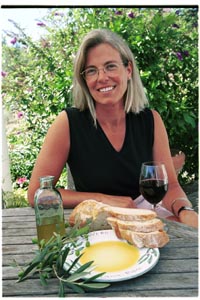![[MetroActive Dining]](/gifs/dining468.gif)
[ Dining Index | Sonoma County | MetroActive Central | Archives ]
Fruit of her labor: Colleen McGlynn rides the Olive Oil Express.
Liquid Gold
Healdsburg couple strikes oil
By Paula Harris
COLLEEN MCGLYNN, dressed casually, with a blunt haircut, glasses, and a dazzling smile that lights up her tanned face, is preparing a little something to nibble in her impressive kitchen. The open room boasts shelves of cookbooks, rows of wine glasses, and a chunky antique weighing scale. A classical-music radio station renders soft piano music. Outside is a pond populated by cranky geese and surrounded by olive groves. More than 4,500 olive trees on 22 acres on the edge of Healdsburg, to be precise. That "nibble" McGlynn is preparing is sure to involve olive oil.
Sure enough, McGlynn pours a slim stream of fragrant olive oil from an old flacon of thick greenish glass onto a white saucer. The unmistakable scent of Meyer lemons rises up from the golden glistening pool. She rips handfuls of crusty bread into bite-sized chunks for dipping--for saturating--and pours out a small glass of red wine. The humble "meal" is complete.
As co-owner of DaVero olive oil company, with husband Ridgely Evers, McGlynn could be dubbed the county's Olive Oil Empress. The Dry Creek Valley appellation oil produced by this Healdsburg company was the first American oil to earn the prestigious extra-virgin designation in Europe. Three years ago, the Sonoma County oil won over Italian and French equivalents during a blind tasting in Imperia, Italy.
The ever-proud McGlynn is obviously truly in love with her product. "Oil is so good--it's just tremendously rich and vibrant and tasty," she enthuses. "It's more that just a fat, it's a flavor."
She even teaches classes on how to "taste" the extra-virgin elixir. "Note how the oil feels in your mouth. It should fill your senses without coating your palate," she instructs. "A good oil will make its presence known, then move on. An inferior oil will linger, leaving you feeling like you've licked paint."
However, McGlynn wasn't always the expert. She grew up on a dairy farm in Wisconsin, where cans of Bertoli olive oil, imported in bulk, and a couple of wizened garlic heads wrapped in cellophane were considered the height of glamour and sophistication. "Wildly exotic and precious," she recalls with a grin. "I was captivated. That's when I began to love food." She embarked on a culinary career, eventually landing a job as a chef at Stars Restaurant in San Francisco.
AFTER FIVE YEARS at Stars, she and two friends opened the now-defunct Samba Java restaurant on Healdsburg plaza. In 1990, Evers and McGlynn planted the first olive trees from precious cuttings discovered in Tuscany. McGlynn currently splits her time between the olive oil business and catering, while Evers, 49, besides making oil, also runs an Internet startup company. But producing the organic gourmet olive oil keeps them plenty busy.
"Just as with wine, it's the fruit you start with that determines everything," explains McGlynn. "And oil, unlike wine, is best when freshest with no manipulation--you pick and crush as soon as you can, you handle the fruit carefully, you press it, and that's it. Unlike wine, where you blend and create flavors, you don't want to interfere with the product."
She carefully holds up the green bottle. Caresses it.
But it's not all romance among the groves: the nitty-gritty reality of being olive farmers can take its toll. Besides being an extremely slow crop, requiring many years to mature, the fruit is also highly susceptible to weather changes. In addition, the recent appearance in the Los Angeles area of the olive fruit fly, a destructive pest that is the olive industry's equivalent of the grape biz's glassy-winged sharpshooter, is a major cause for concern. "It's a huge deal," says Mc-
Glynn. "[The pest] is now in Southern California and is working its way up. It could be a huge problem."
Besides increased delimitation trapping and larval surveys to find out whether the pest is out there, the California Department of Food and Agriculture is hiring staff for expanded trap monitoring and seeking additional state funding to gauge the problem. Still, so far the isolated DaVero farm has seen no sign of the pest, so life continues and the organic oil is produced.
DURING HARVEST time, two tons of olives per day are picked, transported to Marin County, and pressed with a traditional granite stone and hydraulic press at Frantoio Restaurant in Mill Valley.
The oil produced is for finishing and dressing food rather than for heat cooking, which would burn off all the fruit flavors. According to McGlynn, the product contains a harmony of flavors that needs no additives. "There's a green freshness, a pepper taste, and a little bitter tone," she says.
The couple has just introduced the Meyer lemon version of the original oil. Whole Meyer lemons and mission olives are crushed together with the estate oil to give more body, structure, and a slight floral taste. "It's unlike infused oil where they stick something in to flavor it. Here, the oil of two fruits emulsifies," Mc-
Glynn explains.
The result is a vibrant, bright, fresh flavor--perfect drizzled on butter lettuce or to finish a dish of fettuccine with sautéed shrimp, pepper flakes, and garlic.
And if McGlynn and Evers get weary of olives, there's always that old Sonoma County standby--wine grapes. "We just planted five acres of grapes. In four years we'll have Da-
Vero sangiovese," reveals McGlynn. She looks out wistfully at the static pond. "Hmm, maybe we'll create a whole DaVero line."
[ Sonoma County | MetroActive Central | Archives ]
Copyright © Metro Publishing Inc. Maintained by Boulevards New Media.
![]()
 Photograph by Michael Amsler
Photograph by Michael Amsler
From the August 3-9, 2000 issue of the Sonoma County Independent.